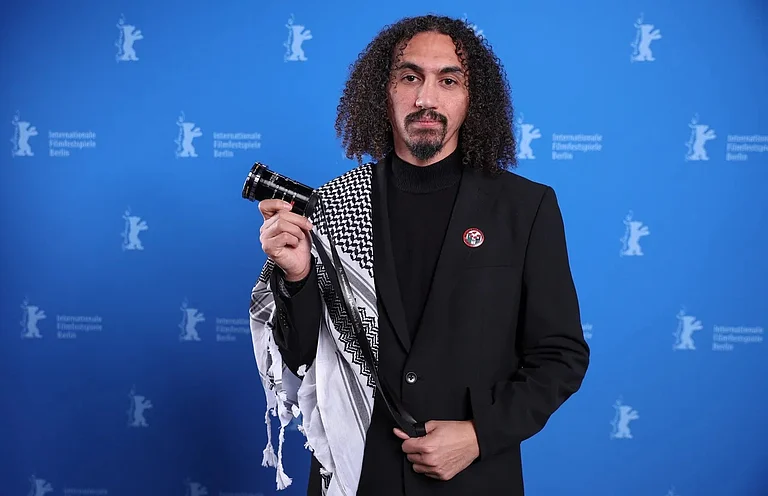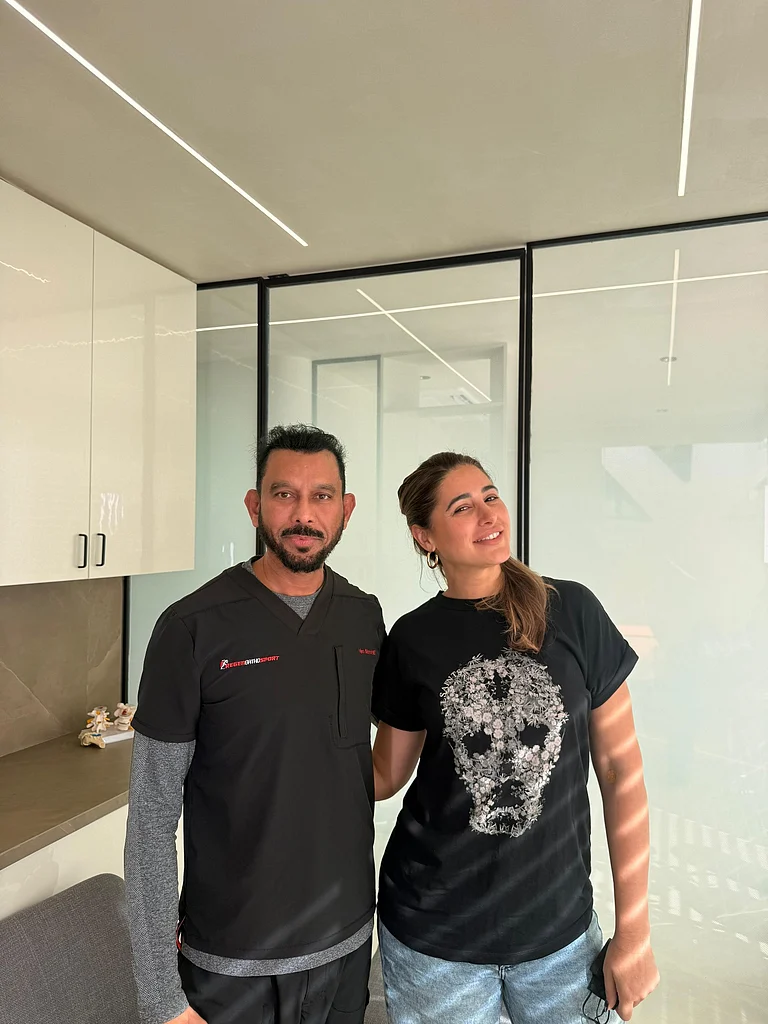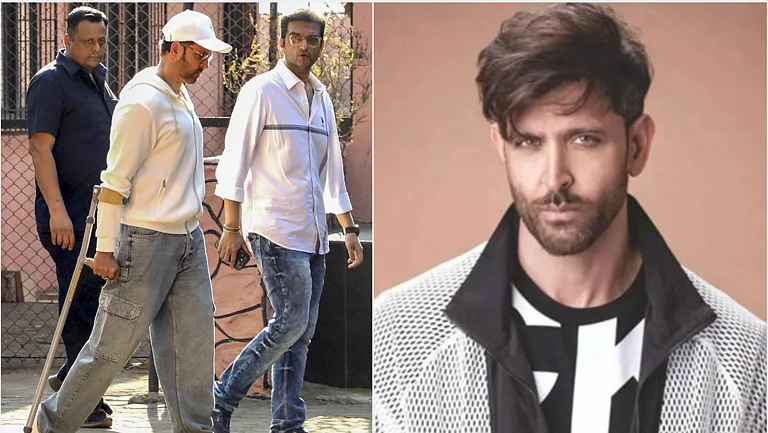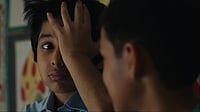
Israeli filmmaker Nadav Lapid has always taken a firm, impassioned stance against his country's insularity and machismo in his works.
His 2019 film, Synonyms, catapulted him to stardom with a Golden Bear win, quickly followed by a Cannes Jury Prize for Ahed's Knee (2021).
His latest work, Yes!, has been shadowed by the Oct 7 aftermath.
Nadav Lapid is a true disruptor. With his noisy, restless and chaotic works, Israel’s firebrand filmmaker has never toed the line with the establishment. He makes angry films that don’t budge from their emphatically critical positions. Lapid has spoken vehemently about Israel’s censorship, emphasizing that the worst part is how Israeli filmmakers have internalized it. “You can’t draw a line between the oppressive apparatus and the oppressed mass, there’s a disgusting harmony,” he said in a 2022 interview to Jewish Currents. As a bitter response to this, his cinema rails at the viewer, his country’s settled resignation into impunity, his own characters and their deep trauma.
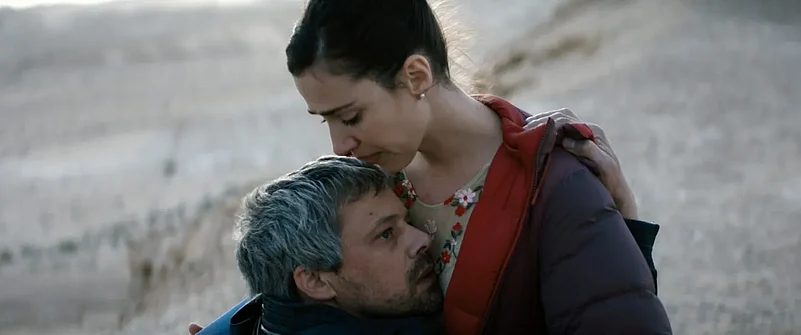
Lapid’s ascendancy to auteur-stardom was sealed with his third feature, Synonyms, snapping up the Golden Bear at the 2019 Berlin Film Festival and a surge of universal acclaim. Yoav’s (Tom Mercier) journey in the film parallels Lapid’s. Lapid emigrated to France after finishing his military service and being thoroughly disenchanted with Israel. All he held onto, as Yoav does, was a resolve to stop being Israeli and start being French. In a 2014 Bomb magazine interview, Lapid said, “I wanted my life to revolve around the sky, trees, love, sex, human nature, and not whether or not to have a peace contract with the Palestinians, whether to give them Gaza, and so on…I felt strangled by this place.” But he also added, “I’ve never felt myself so Israeli as when I was in Paris.”
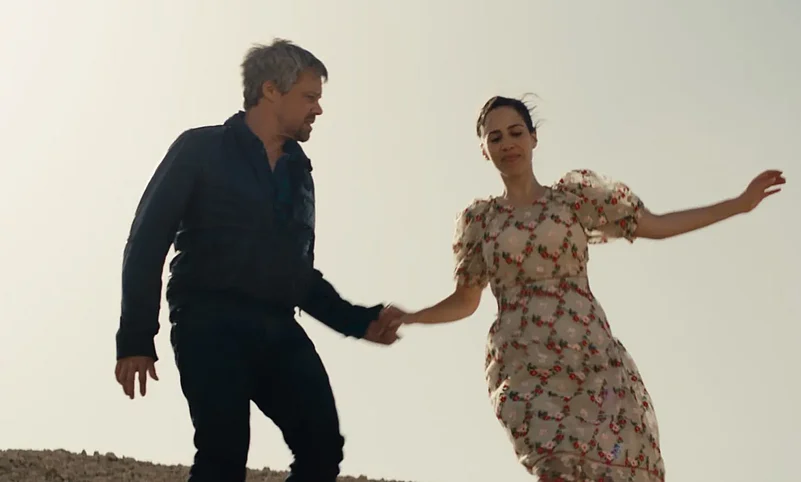
Palestine isn’t so much a hovering presence in Lapid’s works, as it’s shadowed by the brute Israeli nationalism that the director excoriates in film after film. The Israeli government, the sham of its Ministry of Culture, a citizenry too swamped by propaganda to cut out their own opinion—all of them come under the scanner. Lapid sees eye-to-eye with the nation’s blind spot; he interrogates Israel’s refusal to look within and remain suspended in its fairy tales. When Synonyms opens, Yoav sneaks into an apartment in Paris, snuggles in the bathtub and dozes off. Waking up, he finds his clothes missing. A couple living downstairs, Emile and Caroline, give him clothes, cash, a cell phone and a yellow jacket.
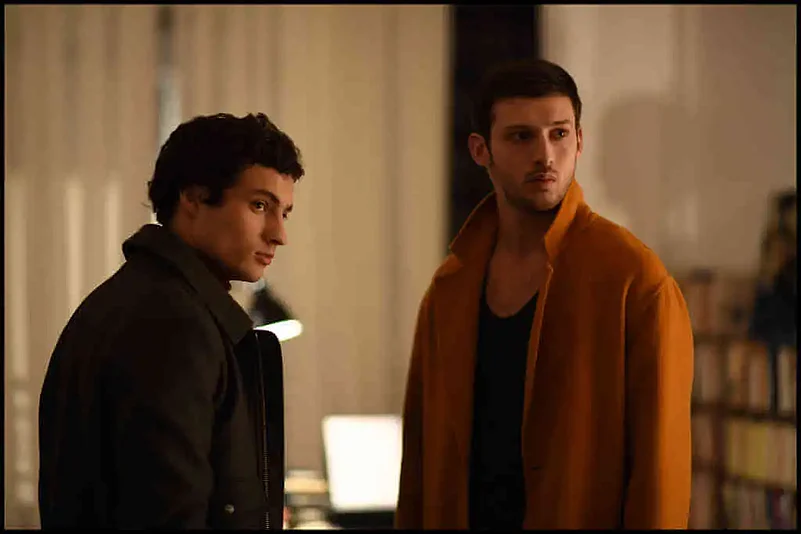
Disgruntled, Yoav rants at Émile he has abandoned Israel for it is ““nasty, obscene, ignorant, idiotic, sordid, fetid, crude, abominable, odious, lamentable, repugnant, detestable, mean-spirited, mean-hearted.” Émile coolly dismisses, “No country is all that at once,” and that he must choose. However, Yoav is certain that “Israel will die” before he does. But his dream of transcending is unrealized in the cruel, apathetic assaults performed by the French. His disillusionment with Israel grows into seeing through France’s ruse—its façade of escape ripped apart. The impossibility of blending in looms increasingly.
Yet Synonyms defuses an easy impulse to square against nationalism. For all his intense urge to shake off Israel, Yoav has breathed its spirit too intimately. His assimilation keeps being deferred, his refashioning to a new culture and language continually tested. He’s so desperate that he’s ready to cede all dignity, give himself fully over so France may absorb him and whittle out any dreg of Israeli-ness in him. But his former political landscape is constantly invoked. For every insistence of him not to utter Hebrew, the French claw deeper. Yoav is hyper-aware that to clutch onto Israel’s language would indicate and aggravate abiding complicity. To free himself of this grasp, he must break away, rejecting the language entrenched in a vicious nationalistic rhetoric. Liberating himself also requires an abdication of the masculine bravado underpinning Israel’s monolithic identity.
But he also becomes an object of fetish, a crucible into which the French pour their perverse, twisted fantasies. He is subjected to endless debasing, humiliations and parodying rituals. He’s pushed towards role play. As much as he tries to erase his past, it’s called up in rounds of mockery and faux assertion. Time and again, he confronts the impossibility of slipping on a new self. Neither does he realize that he’s only trading one nationalism for another, with a nominal change of robes. Cast about in Lapid’s whirlwind of furiously energetic rhythms, Yoav can barely pause and collect himself. Mercier’s somersaulting physicality taps the ricocheting forces of history and identity against individuality. The more he recedes from his roots, the greater the pressure is on him to project an Israeli masculinity. In an unforgettable scene, he does a nude modelling gig for an over-enthused photographer who instructs him to orgasmically scream specifically in Hebrew. What he’s exactly saying is secondary to the language. Politics flows through languages, charged with registers of powerlessness and insubordination.
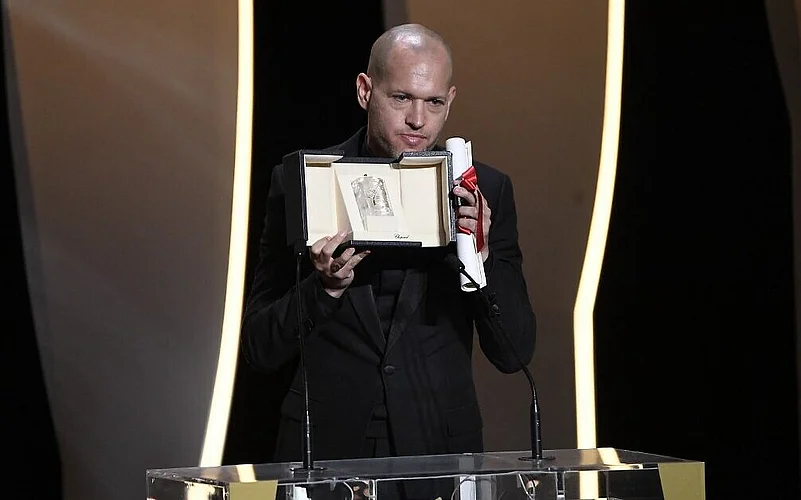
In another scene, a Palestinian refuses to engage with him for work the minute she discovers he’s Israeli. Yoav doesn’t flinch, he’s too busy chasing his French naturalization. His most passionate expression takes the form of singing the French national anthem. Yet, another form of flag-waving nationalism comes forth.
Lapid’s cinema bursts at the seams, uncontained in its force of appeal. Morality and ethics often go for a toss, thrown adrift under the weight of an individual’s fury at his homeland. The camera breathlessly seeks to catch up with this torrent of emotion, whipping about in frenzied movements. Y (Avshalom Pollak), the filmmaker protagonist of Ahed’s Knee (2021) initially hides his agenda, but not his stream of scowling sentiments. Y is preparing his next film on the real-life 2017 incident of the 16-year-old Ahed Tamimi, jailed for slapping two armed Israeli soldiers at a protest. He arrives in the Arava desert for a screening of his film. But he’s handed a list of topics by Yahalom (Nur Fibak), the event organiser and librarian, on which he must speak. Only then will he be given the honorarium for his screening. Noticeably, the list doesn’t include the Israeli occupation. Through coercions, Y gets Yahalom to admit Israel’s Ministry of Culture controls “which books and plays are shown in Israel, and which writers, directors, or artists appear in public or stay at home”.
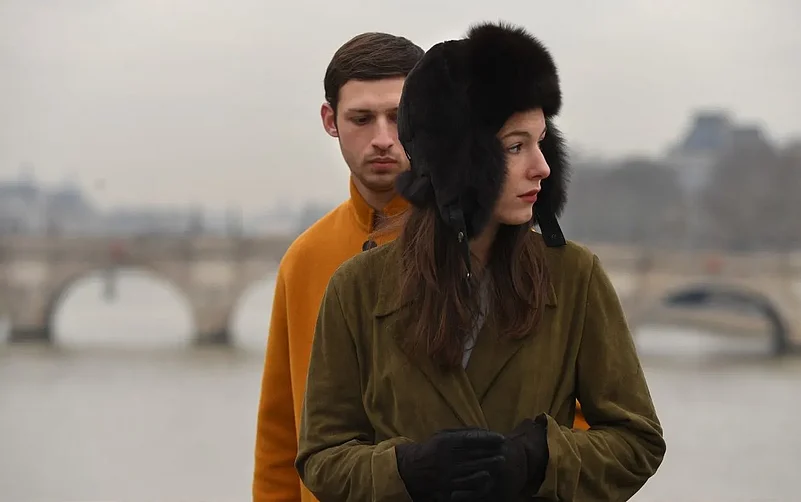
Lapid confesses that while a certain ambivalence could be read into Synonyms’ attitude to Israel, Ahed’s Knee is unequivocal in its rage. Yet, in a 2021 Deadline interview, he also specifies that the film has an “existential ethical” position, instead of a firmly political one. The same applies for Synonyms, which views negotiations through a nihilistic prism. In Ahed’s Knee, many of Y’s frustrations with Israel echo Lapid’s. Y erupts in monologues about Israel as a state that is a “deadly contagious disease” for its citizens. Y keeps inciting the meeker Yahalom, “Suppose I want to discuss a nationalist, racist, abject Jewish state, whose aim is to reduce the Arab soul to incompetence and impotence so it collapses under the state’s oppression.” Shuddering, Yahalom says the obvious. He’d be blacklisted.
With Ahed’s Knee nabbing the Jury Prize at the 2021 Cannes Film Festival, a lot of conversation was spawned in Israel. Several leading figures boycotted Lapid without watching the film. There were also others who agreed with the film’s ideas, yet were besieged with wrath against him for making it. This is a film that dares to call out Israel’s government as the “ugliest” that “hates human freedom”. The reception of Ahed’s Knee amongst Israeli citizens is congruent with Lapid’s hypothesis: Israel’s national policies have percolated across the board.
In the aftermath of Oct 7, Lapid’s latest and reportedly his most provocative film, Yes! endured a stormy production. Actors and crew began dropping out. Despite the filming being in Tel Aviv, Lapid maintained in interviews that it was like shooting a film in “the land of the enemy”. Yes! has been denounced by the Netanyahu government, with the Ministry of Culture slamming it for “opening the wounds of Israeli society”. Though Ahed’s Knee won at Cannes, Yes! was shunted from main competition and programmed in the parallel Directors’ Fortnight section.
Almog Cohen, Deputy Minister in the Prime Minister's Office, and Tali Gotliv, member of the Knesset, lashed out at the inclusion of the film in the Jerusalem Film Festival, stating, “The screening of this film at a nationally significant festival in Jerusalem does not constitute ‘legitimate criticism,’ but rather legitimizes a narrative that seeks to obscure Hamas's crimes, tarnish Israel’s image, and damage national morale.”
In September, Yes! snagged a couple of technical awards from a raft of nominations at the Ophirs, Israel’s equivalent of the Oscars. But soon after, its lead, Ariel Bronz, was detained for a poem posted on Facebook that was said to incite terrorism. Bronz has clashed with the government for years and the particular poem attacks the Israeli prime minister.
The top prize at the Ophirs went to a film about a Palestinian kid from the West Bank. Culture minister Miki Zohar stated, “Israeli Film and Television Academy has not represented the Israeli public and the majority of Israeli citizens, but has instead served as a platform for extremist and delusional voices on the margins of Israeli society that harm the fabric of Israeli society.” The Israeli Academy has also been endangered by a petition by Hollywood A-listers to not to work with any Israeli institution complicit in the genocide.
Lapid appreciates the pledge but sees it as useless. In a recent Variety interview, he noted that filmmakers have to bear the brunt because of a lack of political sanctions against Israel. “What is happening with Israeli cinema is the consequence of the impunity that Israel has enjoyed on a political level. Since European political leaders are doing nothing, the Israeli festival directors and fund directors are caught between a feeling that something must be done and pressure from a certain audience,” he highlighted.
At Cannes, Yes! gave distributors cold feet. Lapid himself has admitted it’s a difficult sell. But it has recently found North American distribution via Kino Lorber. One can only wait to see what sort of audience temper it will attract.









